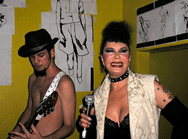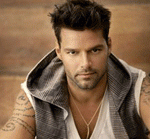On day 17/12 we publish an interview with Franco Reinaudo, coordinator of CADS (Sexual Diversity Affairs Coordination of São Paulo City Hall) where he spoke about two important projects for the year 2010: The Homophobia Map and the São Paulo Gay Parade.
That was the first part of the interview, about what will happen in 2010. In this second part of the interview you can see what happened in 2009 in terms of gay policies.
To the website report The Cape Fanco Reinaudo said that his team deserves a "nine with flying colors". In addition to the self-assessment, the conversation revolved around the new CADS project, which aims to obtain affordable housing for transvestites and transsexuals who live in great vulnerability.
Check out the second part of this exclusive interview with Franco Reinaudo, coordinator of CADS.
What would you like to have done that you didn't achieve in your first year in office?
We are experiencing a difficult year of financial crisis. What we would have liked to have done and were unable to do was start the LGBT studies and memory center, we even got the property... It's a cool project that we will do next year, God willing.
Is there already a plan for CADS in 2010?
We are already building our planning. What we did, even because we didn't have so many resources, was to restructure CADS and the Reference Center to Combat Homophobia. At the Center we managed to bring in two more social workers, a lawyer arrived, we got an administrator, we have six interns… So, the average of thirty consultations that we had at the Center, in November we broke the record of 85 consultations. This is fundamental for us, as we know that this is where we serve the population that is victims of discrimination. We also managed a professionalization program, it's a project we have together with the Department of Labor that gives scholarships in exchange for increased education. We restructured the entire program and next year, we will increase from sixteen scholarships to thirty.
Will the target audience still be the same? (Transvestites and transsexuals in vulnerable situations)
The project is for those who are highly vulnerable. Today we serve transvestites and transsexuals. However, the program is for the entire LGBT population and with this increase in scholarships we will be able to serve a little more. Another cool thing is that we managed to create the first social housing program.
What is this program like?
We are starting a pilot project at the end of the year. There are six transvestites and transsexuals who entered the program. They were people who were in a hostel or in temporary housing. With this program, they will receive help of R$300 to choose a place to live. These people have difficulty renting, in general renters charge five, six times more and there are people who do not accept renting to them, so this is essential for us to recover the inclusion of transvestites and transsexuals.
Which CADS action would you highlight from 2009?
The action of this social rental program. This is something almost unheard of here in the city. We also had a really cool project with the NGO Brasil, a huge event at Center Norte (Expo Center Norte). We managed to include space for LGBT NGOs. The São Paulo LGBT Pride Parade Association (APOGLBT) was there, the Instituto Ser Humano… We created a space for NGOs to be present at an event involving organizations from all over Brazil and it was really cool to see the sexual diversity there.
The restructuring of the Center was very important. We lost the support of the Federal Government and we thought that the Center would not be able to survive. The agreement that came from Brasília was what maintained the professionals. It was a political and important decision to maintain the Center. It was difficult at first, but we managed to keep going.
As soon as you took office, you declared that you would like to unite activism and the private sector. It achieved?
Not yet. This is still a conversation to be had. What happened in a way was trying to somehow value these communication channels. I went to all the council meetings (LGBT Municipal Council), except one, which I couldn't go to. We have always tried to be present in these militant activities. We have established a very cool exchange relationship with the Parade Association, we are working together to organize the Parade. From January we will start holding meetings. That was important.
With the private sector we managed to create some important initiatives, for example, the "Open Your Heart" action. It was important for us to recover, because this is where we have businesspeople carrying out an action that is charitable, which was six years ago and was very important. Having created the economic development nucleus to think about tourism actions. Create a channel with establishments that suffer complaints, to this end we started a communication channel with the sub-prefecture so that the establishments could regularize themselves.
What is your assessment of the LGBT Municipal Council in 2009?
With the advice it was really cool. As I told you, I went to all the meetings and there was the issue of travel. Despite being in a difficult year, we managed to get the council representatives to travel - and we at CADS don't travel (laughs) - only when paid. For me the relationship was super positive. The only thing that I think happens with the council is the difficulty of bringing together a large number of people at the sessions. But then there is the issue of people having difficulties with time. For me, advice is fundamental.
We are creating a project so that from January onwards we will hold large meetings to think about the city and sexual diversity by 2020. Based on what was learned at the municipal LGBT conference, we will create a plan to combat homophobia and build how We want to see the city in ten years and this is a project designed together with the council.
The municipal anti-homophobia law that Mayor Kassab vetoed and had promised to bring back to the agenda this year, did not happen. What is your opinion about it?
We had some conversations, including with councilor Ítalo Cardoso (PT-SP) and his office. The parliamentarian's team proposed a session in the Justice Committee and that did not happen. We tried to talk to them to see what had happened. I don't know if it was because of the end of the year and the issue of voting on the budget. We did the intervention that we could do. Now the PL wants to go back to the Justice Committee and hold a public session and start discussing again. But the cool news is that this will be discussed next year. We as CADS can make this connection.
From zero to ten, what grade do you give for your first year in office?
If we analyze what we had when I took over and what we achieved... I speak not only on my behalf, but on behalf of the team: it deserves a nine with flying colors.



